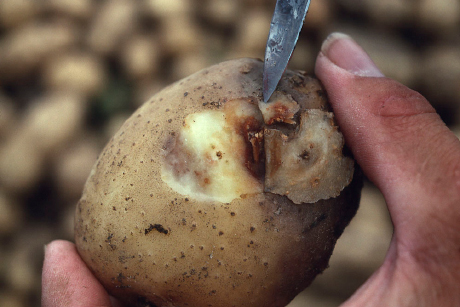History:
The potato in history has had a crucial importance to society. In most cases this was because it was a staple crop for the region. For the Irish before 1845 the potato was important because although it was not native to Ireland it had a crop yield that was twice that of other crops and during the period before the famine it gave nutrition to most of the Irish people. [1]The ripple effect that caused this famine was the fact that wealthy lords in England owned most of the land in Ireland, which resulted in absentee farming. This meant that the lords lived in England, while the poor Irish farmers would get loaned land to farm. This was also a major factor in why potatoes were farmed, because they were cheap and easy to manage from another country. This also led to a form of political factor in that the wealthy land owners had no care for the poor Irish and so when the blight hit the potato crop and the wealthy land owners should have responded, they didn’t. [2]The blight was a potato disease that was caused by the fungus Phytophthora infestans, which is a water mold that infects tomatoes and potatoes and produces a pink rot throughout the plant. This fungus not only caused the potatoes to taste bad, but also caused a minor crop failure to turn into a famine. [3]The circumstances that led to this widespread famine was not only that the disease was able to spread throughout the crops because it was the most common crop throughout Ireland, but also that Ireland was facing an unusually cool moist year that allowed the fungus to prosper. The outbreak and the weather were the main contributors to the spread of such an unruly famine. This famine had a huge impact on Ireland, but also some of the surrounding countries as well. The population of Ireland had fallen from 8.4 million to 6.6 million in just 7 years and over 2 million people from Ireland migrated to countries throughout Europe and the United States. This caused a major population decrease that caused the Irish agricultural society to fall as a whole. The famine also caused the countries that were migrated to have a problem of overcrowded tenements because the poor immigrants could only pay for so much. [4]
Gene Modification:
The potato famine in my opinion could have benefitted greatly from the modification of potato genes. Although this modification would have been much before it’s time and may have not had the research and testing to back it up I believe that it could have caused the potato famine to not be a famine. Although the risks that could come with this benefit is that there is not enough long term evidence in the effects on the human genome. That brings me to the point that with the proper testing and long term research, I think that in the future many genetically modified foods can and will be helpful to society. Ultimately the question presented is the gene modification ethical? In my opinion for food yes, but in people no.
[1]https://www.wesleyjohnston.com/users/ireland/past/famine/potato.html
[2]https://study.com/academy/lesson/irish-famine-contributing-factors-effects.html
[3]https://en.wikipedia.org/wiki/Phytophthora_infestans
[4]https://www.britannica.com/event/Great-Famine-Irish-history